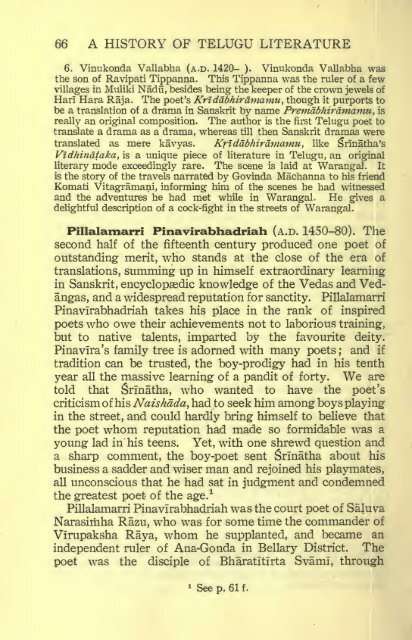A history of Telugu literature; - Cristo Raul
A history of Telugu literature; - Cristo Raul
A history of Telugu literature; - Cristo Raul
You also want an ePaper? Increase the reach of your titles
YUMPU automatically turns print PDFs into web optimized ePapers that Google loves.
66 A HISTORY OF TELUGU LITERATURE<br />
6. Vinukonda Vallabha (A.D. 1420- ). Vinukonda Vallabha was<br />
the son <strong>of</strong> Ravipati Tippanna. This Tippanna was the ruler <strong>of</strong> a few<br />
villages in Muliki Nadu", besides being the keeper <strong>of</strong> the crown jewels <strong>of</strong><br />
Hari Hara Raja. The poet's Krldabhiramamti, though it purports to<br />
be a translation <strong>of</strong> a drama in Sanskrit by name Premddhiramamu, is<br />
really an original composition. The author is the first <strong>Telugu</strong> poet to<br />
translate a drama as a drama, whereas till then Sanskrit dramas were<br />
translated as mere kavyas. Krldabhiramamu, like ^rinatha's<br />
Vldhinataka, is a unique piece <strong>of</strong> <strong>literature</strong> in <strong>Telugu</strong>, an original<br />
literary mode exceedingly rare. The scene is laid at Warangal. It<br />
is the story <strong>of</strong> the travels narrated by Govinda Machanna to his friend<br />
Komati Vitagramani, informing him <strong>of</strong> the scenes he had witnessed<br />
and the adventures he had met while in Warangal. He gives a<br />
delightful description <strong>of</strong> a cock-fight in the streets <strong>of</strong> Warangal.<br />
Pillalamarri Pinavirabhadriah (A.D. 1450-80). The<br />
second half <strong>of</strong> the fifteenth century produced one poet <strong>of</strong><br />
outstanding merit, who stands at the close <strong>of</strong> the era <strong>of</strong><br />
translations, summing up in himself extraordinary learning<br />
in Sanskrit, encyclopaedic knowledge <strong>of</strong> the Vedas and Ved-<br />
angas, and a widespread reputation for sanctity. Pillalamarri<br />
Pinavirabhadriah takes his place in the rank <strong>of</strong> inspired<br />
poets who owe their achievements not to laborious training,<br />
but to native talents, imparted by the favourite deity.<br />
Pinavira's family tree is adorned with many poets ;<br />
and if<br />
tradition can be trusted, the boy-prodigy had in his tenth<br />
year all the massive learning <strong>of</strong> a pandit <strong>of</strong> forty. We are<br />
told that Srinatha, who wanted to have the poet's<br />
criticism <strong>of</strong> his Naishada, had to seek him among boys playing<br />
in the street, and could hardly bring himself to believe that<br />
the poet whom reputation had made so formidable was a<br />
young lad in his teens. Yet, with one shrewd question and<br />
a sharp comment, the boy-poet sent Srinatha about his<br />
business a sadder and wiser man and rejoined his playmates,<br />
all unconscious that he had sat in judgment and condemned<br />
the greatest poet <strong>of</strong> the age. 1<br />
Pillalamarri Pinavirabhadriah was the court poet <strong>of</strong> Saluva<br />
Narasimha Razu, who was for some time the commander <strong>of</strong><br />
Virupaksha Raya, whom he supplanted, and became an<br />
independent ruler <strong>of</strong> Ana-Gonda in Bellary District. The<br />
poet was the disciple <strong>of</strong> Bharatitirta Svami, through<br />
1<br />
Seep.<br />
61 f.

















